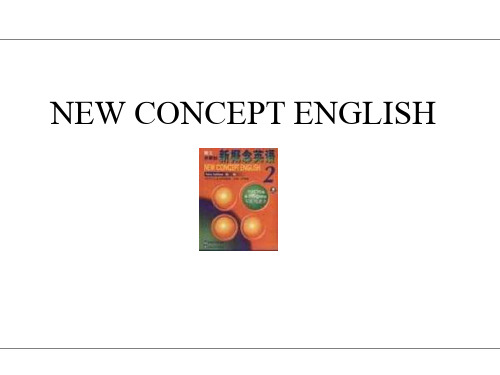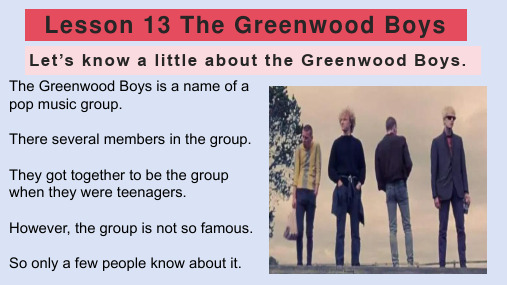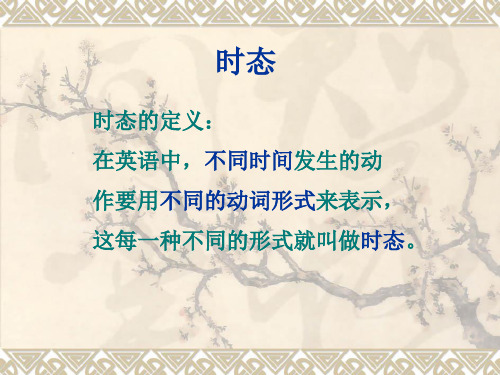新概念英语第二册课件ppt
合集下载
新概念英语第二册课件Lesson16(共14张PPT)

• ★fail v. 无视,忘记 fail v.失败 fail+宾语:失败做某事 fail in doing sth:在某些方面失败 He failed./He failed in examination. fail to do:没有能够在某事 He failed to swim across the river. not fail to do sth.一定能够某事 I can not fail to pass it. You can not fail to drive it.你一定能够驾驶 If you receive a request like this, You can not fail to obey it. If you arrived in Beijing ,you cannot fail to find the New Oriental School.
New words and expressions
★note n. 便条 m• essage:消息 note:纸条,纸钞 make notes:做笔记 ★area n. 地段 area:场地,地段(一块对方) place:地点 region:地区(交战,开火)
In this region, there were a lot of wars. ★sign n. 指示牌 ★reminder n. 提示 remind v.:提示,提醒
Comprehension questions
• 6.Where were you spending a holiday? • In Sweden. • 7.What did you find on your car? • A note. • 8.Did it welcome you ti the city? • Yes, it did. • 9.Were you in a ‘No parking’ area? • Yes, I was. • 10.What did the note ask you to pay attention to? • To the street signs.
New words and expressions
★note n. 便条 m• essage:消息 note:纸条,纸钞 make notes:做笔记 ★area n. 地段 area:场地,地段(一块对方) place:地点 region:地区(交战,开火)
In this region, there were a lot of wars. ★sign n. 指示牌 ★reminder n. 提示 remind v.:提示,提醒
Comprehension questions
• 6.Where were you spending a holiday? • In Sweden. • 7.What did you find on your car? • A note. • 8.Did it welcome you ti the city? • Yes, it did. • 9.Were you in a ‘No parking’ area? • Yes, I was. • 10.What did the note ask you to pay attention to? • To the street signs.
新概念英语第二册课件Lesson11共27张PPT

off for back
1. Should I pay ___ the drinks? 2. We should be able to pay __ the
debt wiபைடு நூலகம்hin two years. 3. He will pay ____ the money in
monthly installment 4. Did your plan pay ___?
•. ………when Tony Steele………
Tony ………years ago, but he is now……..
He…….salary, but he………. friends and never……..
Tony saw…….and…..and……..
•He has never………
collect/pick up salary/wages
pay back [1]偿还,还钱给(某人);
EG: Will you lend me $10? I will pay you back next month. [2]回报 How can I pay you back for all your kindness? 我该怎样报答你的好意呢?
• The Ant and the Dove An ant is walking by the river. He looks at the river and says to himself, “How nice and cool this water looks! I must drink some of it.” But when he is drinking, he slips into the river. “Oh.Help!Help!” The ant cries, A dove is sitting in the tree. She hears him and throws him a leaf, “Climb up that leaf,” she says “and you will float bank.” The ant climbs onto the leaf, and the wind blows the leaf to the bank. And the ant is saved. “Thank you, Dove. You’re so kind,” The ant says and runs home, “You have saved my life, and I wish I could do something for you, Goodbye!” “Goodbye!” says the dove, “Be careful. Not to fall into the river again.” After a few days, the dove is building her nest. And a man is raising his gun to shoot her. The ant sees this, and runs quickly to bite the man’s leg. “Ouch! Ouch!” The man feels pained and drops his gun. The dove hears and flies away. So the man picks up his gun and leave. The dove comes to her nest. “Thank you, my little friend,” she says, “You have saved my life.” The little ant is so glad, because he can help the dove.
新概念英语第二册课件Lesson18共15页PPT

land 陆地;土地 lord 贵族;勋爵(包括公侯伯
子男)
3.bill /bil/ n. 帐单
• 1.议案;法案 • 2.纸币;钞票 • 3.广告;海报 常用搭配: foot the bill 付账;负责 pay/settle the bill 付账 fill the bill 适合
text
• 1、After I had had lunch at a village pub, I looked for my bag.
• Pub是public house(酒店,酒店) 的缩写
• Let’s go to the pub for a drink.
• 2、I had left it on a chair beside the door and now it wasn't there!
• leave除了“离去,离开,出发” 的意思,还可以表示“把(人、 物)留下,遗留,丢下”等。
还有许多其他事要做。 • beside pron. 在……旁边,在……附近 • besides adv. 而且,并且,此外;pron. 除……
之外(还)
• I’m quite busy today. Besides, I’ve got a bad cold.
• There were a lot of people at the party besides us.
Have的用法
• 1、have作为助动词构成各种完成时和完成 进行时
• 2、have还可以作完全动词,当作“具有、 拥有”讲时,它和have got通常可以互换。 have做 “有, 患病” 概念时, 可作为实义动 词, 也可作为非实义动词。在英国英语中的 疑问句和否定句中have(具有)的用法与 be相同,即可以不用助动词do或did;在美 国英语中,常用do助动词和have一起构成 疑问句和否定句。
子男)
3.bill /bil/ n. 帐单
• 1.议案;法案 • 2.纸币;钞票 • 3.广告;海报 常用搭配: foot the bill 付账;负责 pay/settle the bill 付账 fill the bill 适合
text
• 1、After I had had lunch at a village pub, I looked for my bag.
• Pub是public house(酒店,酒店) 的缩写
• Let’s go to the pub for a drink.
• 2、I had left it on a chair beside the door and now it wasn't there!
• leave除了“离去,离开,出发” 的意思,还可以表示“把(人、 物)留下,遗留,丢下”等。
还有许多其他事要做。 • beside pron. 在……旁边,在……附近 • besides adv. 而且,并且,此外;pron. 除……
之外(还)
• I’m quite busy today. Besides, I’ve got a bad cold.
• There were a lot of people at the party besides us.
Have的用法
• 1、have作为助动词构成各种完成时和完成 进行时
• 2、have还可以作完全动词,当作“具有、 拥有”讲时,它和have got通常可以互换。 have做 “有, 患病” 概念时, 可作为实义动 词, 也可作为非实义动词。在英国英语中的 疑问句和否定句中have(具有)的用法与 be相同,即可以不用助动词do或did;在美 国英语中,常用do助动词和have一起构成 疑问句和否定句。
新概念英语第二册lesson40课件共25张PPT

3. If I ______ you, I ______ more attention to English idioms
and phrases.
A. was; shall pay
B. am; will pay
C. would be; would pay D. were; would pay
4. —Alice, why didn’t you come yesterday? —I ______, but I had an unexpected visitor. A. had B. would C. was going to D. did
① v. 使……固定、安装 fix the picture on the wall She fixed a handle on the door. ② v. 修理 fix on使(目光、注意力等)集中于,盯着 fix one's eyes on sth./ one's eyes be fixed on sth.盯着……目不转睛 All the eyes were fixed on the blackboard.
2).If he had taken my advice,he would not have made such a mistake. 如果他听我的劝告的话,就不会犯这样的错误了。(事实:没有听我的话)
Exercises:
1. I don’t think that I shall fail. But if I ______, I would try again. A. should fail B. would fail
2.Mrs. Rumbold was a large, unsmiling lady in a tight black dress. unsmiling adj. 不笑的 unsmiling的反义词为 smiling 有些形容词前面可以加上前缀un-来表示相反的意义:
新概念英语第二册Lesson 52 A pretty carpet 课件(共19张PPT)

not only since 因为(连词)
2024/9/11
but
as well
because 1.表示直接原因
since
2.它所指的原因通常是听话人所不知道的,即说话人认为听话人不知道 3.通常被放置于主句之后 4. 常用来回答why的提问 1.显然的或已为人所知的理由,常译为 “既然”
2.语气比because稍弱,通常置于句首,表示一种含有勉强语气的原因。
2024/9/11
现在完成时和现在完成进行时的区分 1.现在完成时表示动作已经结束,而完成进行时并不一定如此 2. 完成时强调动作的结果,完成进行时强调动作持续的时间
2024/9/11
have explained earned
understand
Are has been working
listenning
as 含义与since相同,但语气更弱,没有since正式,常译为“由于,鉴于”
2024/9/11
2024/9/11
现在完成时 have/has + done 1.动作发生在过去对现在还有影响 2.动作发生在过去一直持续到现在 现在完成进行时 have/has + been + doing 1.动作发生在过去,一直延续到现在,还可能继续延续下去 2.表示重复性动作 3.表示感情色彩
2024/9/11
2024/9/11
has
earned
didn’t listen
2024/9/11
形容词和副词 1.形容词变为副词后意思可能有所改变。 2.有一些形容词变为副词时不需要改变形式 (既可以作形容词,也可以作副词)
2024/9/11
3.有一些形容词ly以后,变成一个新的副词,意思和原词无关
新概念第二册 PPT 课件

旅游英语
将课程内容与旅游场景相 结合,教授学生在旅游过 程中如何运用英语进行沟 通和表达。
课程实践活动的组织与实施
小组讨论
组织学生进行小组讨论,培养学 生的团队协作和沟通能力,提高 学生的口语表达和听力理解能力
。
角色扮演
组织学生进行角色扮演活动,模拟 真实场景中的对话和交流,培养学 生的口语表达和听力理解能力。
倒装句。
03
课程实践与应用
听说读写各项技能训练
听力训练
通过播放英语音频材料,训练 学生的英语听力理解能力,提 高语音识别和信息捕捉能力。
口语训练
通过模拟真实场景的对话练习 ,培养学生的英语口语表达能 力,增强自信心和沟通技巧。
阅读训练
通过阅读英文文章和短篇小说 ,提高学生的阅读理解能力和 词汇量,培养阅读兴趣和习惯 。
03
和英语能力,以便更好地引导学生学习。
如何根据学生需求选择合适的教材
了解学生需求
在选择教材之前,教师应了解学生的 学习目标、英语水平、兴趣爱好等,
以便选择最适合学生的教材。
考虑学生的实际生活经验和背景,选 择更贴近学生需求的教材。
比较不同教材的特点
教师应对各种教材进行比较,了解其 特点、难度、教学方法等,以便为学 生选择最适合的教材。
教学内容:都涵盖了语法、词汇、阅读、听力等语言学习的各个方面。
与其他教材的异同点分析
• 教学方法:都采用了多种教学方法,如任务型教学、情景 教学等。
与其他教材的异同点分析
01
不同点
02
教材内容:新概念第二册与其他教材在内容上有所不同,新概念第二 册更注重实际应用,话题更贴近生活。
03
难度:新概念第二册的难度相对于其他教材略高,语法点和词汇量更 大。
新概念英语第二册课件Lesson 25(PPT)

2 . Did he understand you at last or not? Could you understand his answer? ( but)
3 . Did your teacher ever speak English like that or not? 4 . What did the porter say to you?
English亦可作形容词,表示“英格兰的”“英国 的”“英国人的”等
He was English.
I arrived in London at last. He arrived at the airport an hour ago.
At last表示“终于”,一般暗指经过一番等、麻 烦或努力以后终于得到或做到。
6. 不知道为什么博物馆今天关门了。 I wonder why the museum is closed today.
7. 我在想你会不会帮我。 I’m wondering if you could help me.
8. 这是个巨大的奇迹。 It’s a great wonder.
Key words
Do the English speak English? English在这里均为名词,但意义不同。第一个 指____,为总称,后面的动词必须用复数; 第二个指____ 。指语言时前不加冠词,指人 时则要加the:
The English often talk about _____.
Do you speak English?
3. 当either …or和neither … nor连接主语时,谓语 动词与后一个主语保持一致。
Neither Liz nor I teach mathematics.
3 . Did your teacher ever speak English like that or not? 4 . What did the porter say to you?
English亦可作形容词,表示“英格兰的”“英国 的”“英国人的”等
He was English.
I arrived in London at last. He arrived at the airport an hour ago.
At last表示“终于”,一般暗指经过一番等、麻 烦或努力以后终于得到或做到。
6. 不知道为什么博物馆今天关门了。 I wonder why the museum is closed today.
7. 我在想你会不会帮我。 I’m wondering if you could help me.
8. 这是个巨大的奇迹。 It’s a great wonder.
Key words
Do the English speak English? English在这里均为名词,但意义不同。第一个 指____,为总称,后面的动词必须用复数; 第二个指____ 。指语言时前不加冠词,指人 时则要加the:
The English often talk about _____.
Do you speak English?
3. 当either …or和neither … nor连接主语时,谓语 动词与后一个主语保持一致。
Neither Liz nor I teach mathematics.
新概念英语第二册Lesson2完整课件

② Tomorrow I'll ring you. vt. 打电话给(美语中用call) ring sb. 给某人打电话
③ n. (打)电话 give sb. a ring 记得打电话给我! Remember to give me a ring.
④ n. 戒指 wedding ring
aunt n. 姑,姨,婶,舅妈 uncle n.叔叔,舅舅,姑父 他们的孩子:cousin[ˈkʌzn] 堂兄妹(不分男女) cousin的孩子:
'Do you always get up so late? It's one o'clock!'
I'm coming to see you. 用 come 的现在进行时态 be coming 表示一般将来,表示 近期按计划或安排要进行的动作。 同样用法的动词有: go,come,leave,arrive… 你马上就要离开吗? Are you leaving at once? 明天他就到了。 He is arriving tomorrow.
repeat v. 重复 不要重复! Don't repeat!
他们正在重复那个有趣的游戏。 They are repeating that interesting game.
Why was the writer's aunt surprised?
It was Sunday. I never get up early on Sundays . I sometimes stay in bed until lunchtime. Last Sunday I got up very late. I looked out of the window. It was dark outside . 'What a day!' I thought. 'It's raining again.' Just then, the telephone rang . It was my aunt Lucy. 'I've just arrived by train,' she saidSu.nd'aI'yms coming to see you.'
③ n. (打)电话 give sb. a ring 记得打电话给我! Remember to give me a ring.
④ n. 戒指 wedding ring
aunt n. 姑,姨,婶,舅妈 uncle n.叔叔,舅舅,姑父 他们的孩子:cousin[ˈkʌzn] 堂兄妹(不分男女) cousin的孩子:
'Do you always get up so late? It's one o'clock!'
I'm coming to see you. 用 come 的现在进行时态 be coming 表示一般将来,表示 近期按计划或安排要进行的动作。 同样用法的动词有: go,come,leave,arrive… 你马上就要离开吗? Are you leaving at once? 明天他就到了。 He is arriving tomorrow.
repeat v. 重复 不要重复! Don't repeat!
他们正在重复那个有趣的游戏。 They are repeating that interesting game.
Why was the writer's aunt surprised?
It was Sunday. I never get up early on Sundays . I sometimes stay in bed until lunchtime. Last Sunday I got up very late. I looked out of the window. It was dark outside . 'What a day!' I thought. 'It's raining again.' Just then, the telephone rang . It was my aunt Lucy. 'I've just arrived by train,' she saidSu.nd'aI'yms coming to see you.'
新概念英语第二册The Greenwood Boys绿林少年课件(共24张PPT)(2024年)

到会的人比平时多了几个。
We wil learn a new tense!
The future progressive tense将来进行时
将来进行时 will be doing
模仿造句:Make sentences as below.
一般将来时 will/shall do
VS
将来进行时 will/shall be
爸爸的
杰克的
孙悟空的
名词所有格! 老师的 你会用吗?
村庄的
人民的
’s构成的名词所有格,即“.......的”
father’s book 爸爸的书
名词所有格
Jack’s 风筝 杰克的风筝
口诀: 一般规则 直接在后面加’s
my sister’s bag 我姐的包
this dog’s food 这只狗的食物
二、Read
ASK YOU
to cicle what you can not understand!
You should
read new words and expressions on page 60.
Try to
translate the text in your own way.
三、Accumulate
doing
前者的will 常有蓄意为之的含义,如表示主语的意愿、决心、许诺等。 而后者则没有此意,并只表示单纯的将来或之陈述将来的事实。
When will you send an e-mail to that manager? (如上司对下属) 你什么时候给那位经理发邮件?
What will you be doing tomorrow ev ening?(没有意图,只问事 实) 你明天傍晚干什么呀?
新概念第二册英语时态课件 (共29张PPT)

时间状语从句(when, until after, before until, etc)
条件状语从句(if,unless, etc)
让步状语从句(though, although, etc)
1.一般现在时
3.表示永恒的真理,即使出现在过去的语境中,仍然用一般现 在时。
4. 在make sure (certain)=see to it, mind, care, matter + 宾
come true, consist of ,take place, happen, occur, break out, appear, arrive, die, fall, last, exist, fail, succeed, become, rise, 二、下列动词主动表被动,常与well, quite, easily, badly等连用
6、S+ was /were + being + pp….(过去进行时)
7、S+ has /have +been+ pp…. (现在完成时)
8、S+ had been + pp….
(过去完成时)
9、S+情态动词+ be+ pp….
(情态动词)
语态考点
一、不能用于被动语态的情况 所有不及物动词或不及物动词词组不用被动式:
❖ 表示状态存在的动词:be, exist, remain, stay, 等。 ❖ 表示占有或存属关系动词:have, own, belong, contain等。 ❖ 表示思考、理解等心理活动的动词:believe, doubt,
forget, know, remember, understand等。
条件状语从句(if,unless, etc)
让步状语从句(though, although, etc)
1.一般现在时
3.表示永恒的真理,即使出现在过去的语境中,仍然用一般现 在时。
4. 在make sure (certain)=see to it, mind, care, matter + 宾
come true, consist of ,take place, happen, occur, break out, appear, arrive, die, fall, last, exist, fail, succeed, become, rise, 二、下列动词主动表被动,常与well, quite, easily, badly等连用
6、S+ was /were + being + pp….(过去进行时)
7、S+ has /have +been+ pp…. (现在完成时)
8、S+ had been + pp….
(过去完成时)
9、S+情态动词+ be+ pp….
(情态动词)
语态考点
一、不能用于被动语态的情况 所有不及物动词或不及物动词词组不用被动式:
❖ 表示状态存在的动词:be, exist, remain, stay, 等。 ❖ 表示占有或存属关系动词:have, own, belong, contain等。 ❖ 表示思考、理解等心理活动的动词:believe, doubt,
forget, know, remember, understand等。
